Search Results
UPDATE — Clean Energy’s Natural Gas Highway
February 29th, 2012 by Fiedler Group
Earlier this month, we featured Clean Energy’s Natural Gas Highway — a network of liquefied natural gas (LNG) truck fueling stations.
Shortly thereafter, CNBC’s Jim Cramer welcomed Read the rest of this entry »
Clean Energy’s Natural Gas Highway
February 8th, 2012 by Fiedler Group
Across interstate highways and major metropolitan areas, a network of liquefied natural gas (LNG) truck fueling stations are being built by Clean Energy — America’s largest provider of natural gas fuel for transportation.
Fiedler Group Applauds Rimere’s Breakthrough Plasma Technology: Pioneering Clean Hydrogen and Graphene Solutions
March 25th, 2024 by Fiedler Group
In the race to combat climate change, innovation is key. Rimere, a climate solutions company based in Newport Beach, California, has developed a proprietary plasma technology that looks to revolutionize the energy landscape. Recently, Rimere announced a significant milestone: the closing of a $10 million strategic investment from Clean Energy Fuels Corp. (NASDAQ: CLNE). This injection of funds is set to accelerate the development and field testing of Rimere’s groundbreaking devices: the Reformer and the Mitigator.
Rimere’s patented and patent-pending technologies operate at a molecular level, employing high voltage and high-frequency arcs under induced electromagnetic fields to deconstruct methane. This innovative approach is poised to reshape the outlook for natural gas, leveraging existing infrastructure to deliver clean hydrogen and graphene to end-users.
At the core of Rimere’s innovation lies the Reformer, a device that utilizes proprietary sequential hybrid plasma technology to convert natural gas into two invaluable resources: clean hydrogen and high-quality graphene. This game changing technology produces zero CO2 emissions, and when powered by renewable natural gas (RNG), achieves a negative carbon-intensity rating surpassing renewable electrolysis in emission reduction.
The Mitigator offers a cost-effective solution to a pressing environmental concern. This device, a plasma thermal oxidizer, diminishes fugitive methane emissions by significantly reducing greenhouse gas potency, particularly those emissions escaping from natural gas infrastructure like compressors and pneumatic controllers along pipelines.
Mitchell Pratt, CEO of Rimere, is encouraging about the impact of their technology. “The world continues to consume more natural gas annually, but with Rimere’s technology, we’re not just cleaning up the infrastructure; we’re transforming the role of natural gas in our clean energy future.”
For Clean Energy Fuels Corp., this investment represents a natural progression in their ongoing commitment to environmental stewardship. Andrew J. Littlefair, President, and CEO of Clean Energy, sees Rimere’s technology as a logical step in addressing the challenges facing the natural gas and hydrogen industries.
With $18.25 million of committed capital raised since its formation in 2020, Rimere is poised to make a significant impact on the transition to a cleaner, greener future.
CHEVRON RNG/CNG STATIONS – The Quest for a Cleaner Tomorrow
March 12th, 2024 by Fiedler Group
One day, Renewable Natural Gas (RNG) will help reduce the life cycle carbon intensity of transportation fuels while meeting the world’s growing energy needs. Chevron is one of the world’s leading integrated energy companies and a pioneer in the clean energy transition through relationships with partners to drive innovation such as developing a process where compressing RNG creates Compressed Natural Gas or CNG.
RNG is biogas produced from multiple sources, including livestock waste, landfills, wastewater sludge, food waste and other organic waste operations. RNG’s multi-uses which include for electricity generation, heating and cooking, bioplastics, and vehicle fuel can help improve local air quality and greenhouse gas reductions and reduce agricultural methane release in the atmosphere. Chevron works with its partners in the United States to convert methane from cow waste into RNG, which the U.S. and California classify as an advanced biofuel for transportation, for use in heavy-duty vehicles.
CNG stands out as an environmentally friendly and non-toxic alternative to conventional gasoline and diesel fuels. Its adoption contributes to a reduction in harmful emissions and eliminates the risk of groundwater contamination. By compressing natural gas (methane) to less than 1% of its original volume, CNG has gained traction among both commercial and non-commercial vehicle users.
Chevron continues to expand access to low-carbon fuels for heavy-duty vehicles by establishing a network of 30 CNG stations in California by 2025 and highlighting the Company’s commitment of producing 40,000 million BTUs of Renewable Natural Gas (RNG) daily by 2030.
Given their extensive experience with both CNG and LNG, Fiedler Group was contracted by Wayne Perry Inc (WPI – Chevron’s construction contractor) to provide Front-End Engineering and Design (FEED) services for four groundbreaking projects. Along with WPI, Fiedler Group has played a pivotal role in turning Chevron’s sustainability vision into a reality by delivering a comprehensive range of engineering and project management services, that includes entitlement processing, construction documents, and permitting.
LOST HILLS
Located at 21981 Hwy 46, the Lost Hills project represents the first Heavy Duty Vehicle CNG fueling project that Fiedler Group designed and permitted for Chevron. Fiedler Group provided a full range of design services, overcoming various challenges to bring the project to fruition.
Careful consideration was given to the placement of the CNG equipment compound and fueling canopy to utilize existing entrance and egress driveways, ensuring efficient vehicle flow. Additionally, installing the equipment compound around the existing monument sign while maintaining necessary clearances for system vents demonstrated Fiedler Group’s design expertise and attention to detail.
Construction of the Lost Hills CNG station was successfully completed in December of 2021, adding another milestone to Chevron’s portfolio of sustainable infrastructure developments.
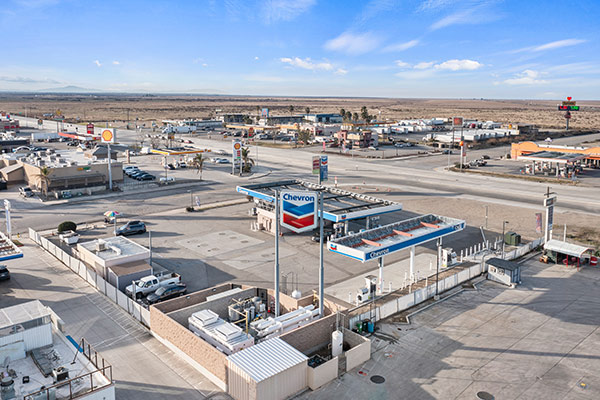
VISALIA
In 2022 Chevron made headlines with the opening of its second CNG station in California. Located at 8835 W. Goshen Avenue in Visalia, this Chevron CNG station was the result and yet another step toward executing Chevron’s vision. The successful completion of this station was a collaboration between Chevron, Valley Pacific, a prominent fuel marketer in California, Wayne Perry Inc, and Fiedler Group.
The installation of a new compression, storage, and dispensing system was a key component of the project as was navigating the challenges posed by the station’s location in a floodplain. Fiedler Group achieved compliance with building code requirements by designing an elevated electrical area and re-engineered the existing retention pond to accommodate the station’s footprint without compromising its functionality.
The ongoing success of the Visalia station underscores Chevron and its partners’ commitment to environmental stewardship and sustainable infrastructure development.
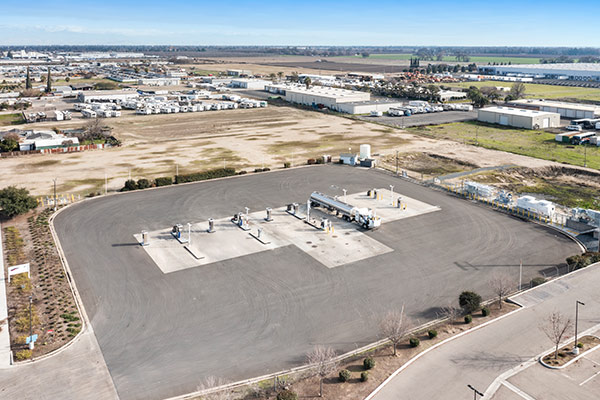
MONTEBELLO
The Montebello Heavy-Duty Vehicle RNG Fueling Station, located at 601 S. Vail Avenue, was the third station designed and constructed in Chevron’s quest for a cleaner tomorrow.
The path to achieving this vision, however, was not without its share of challenges. The Montebello project found its home on a portion of the existing Montebello Chevron Terminal that lacked power infrastructure, proper drainage and the appropriate ingress and egress. Despite these hurdles, the Fiedler Group innovative design incorporated a new 3-lane fueling canopy and equipment enclosure, optimizing space and functionality.
The culmination of these efforts was marked on September 8, 2023, with the successful completion of the RNG fueling station. This accomplishment signified not only another step forward in Chevron’s commitment to an eco-friendlier future but also a testament to how collaboration between industry leaders, innovative engineering, an experienced general contractor, and a dedication to environmental responsibility can lead to transformative results.
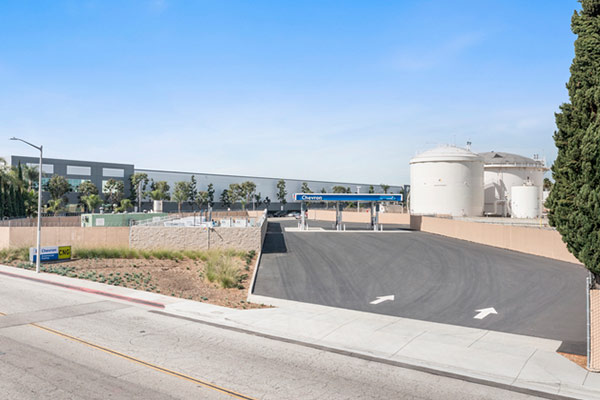
STOCKTON
Building on the successful openings of the Lost Hills, Visalia and Montebello Stations, Chevron opened the Stockton project marking the fourth Heavy Duty Vehicle CNG fueling project that Fiedler Group designed and permitted.
Situated at 1524 S. Fresno Avenue in the City of Stockton, the project once again posed notable challenges including the site’s lack of power and existing natural gas service as well the location of an adjacent drainage pond to the site. Despite these obstacles, Fiedler Group successfully designed a new 2-lane fueling canopy and equipment enclosure, adapting the station to its surroundings while ensuring minimal disturbance to the pond.
Moreover, redesigning the existing entrance and egress driveways to accommodate heavy-duty vehicles posed another challenge, which was adeptly addressed by WPI during the construction phase. Construction of the Stockton CNG station was completed in October 2023, further solidifying Chevron’s commitment to providing sustainable fueling solutions.
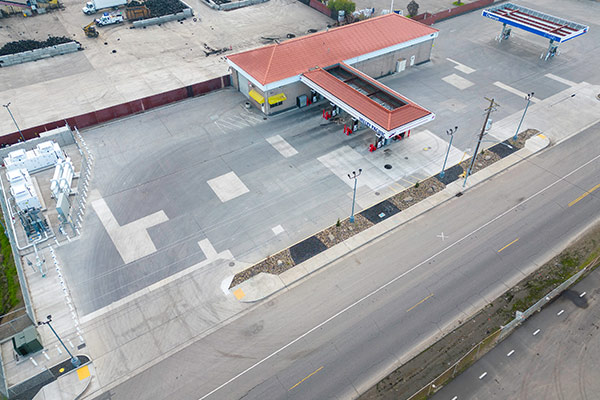
CONCLUSION
These projects not only promote clean energy but also exemplify the power of engineering and design in overcoming challenges when bringing this important technology to market. To learn more about how Fiedler Group can service your project needs, please contact us here.
Fuelcell Energy and Toyota: Pioneering the Future With the World’s First “Tri-gen” Production System
September 8th, 2023 by Fiedler Group
Introduction
On September 7, 2023, FuelCell Energy, Inc. (FCE) and Toyota Motor of North America (Toyota) unveiled the world’s first “Tri-gen system” at Toyota Logistic Services (TLS) Long Beach. This innovative energy solution, owned and operated by FCE, makes TLS the first port vehicle processing facility in the world powered by onsite-generated, 100% renewable energy. The “Tri” refers to on-site generation of renewable electricity, hydrogen, and water from biogas. A major breakthrough in the scalability of hydrogen-powered fuel cell technology, it promises to transform the way we power logistics and transportation facilities, signaling a pivotal moment in the journey towards cleaner energy. The Tri-gen system showcases the potential and economic viability of hydrogen-based energy production, offering inspiration for other industries and regions. Beyond its technological significance, Tri-gen symbolizes the power of collaboration and innovation in shaping a greener future amid the challenges of climate change.
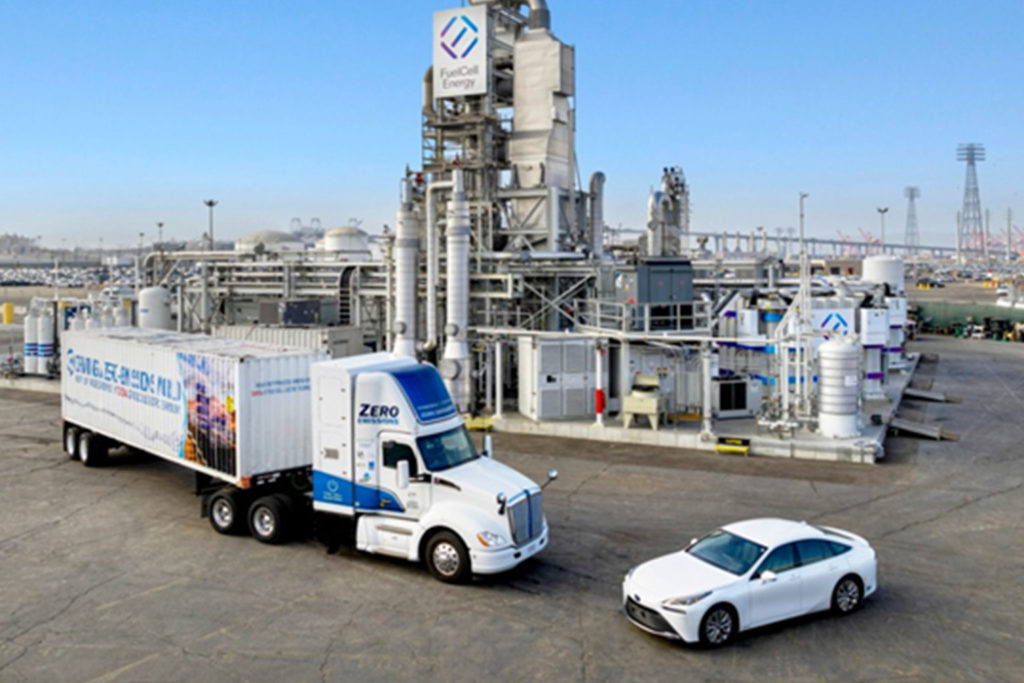
Tri-gen: A Game-Changer in Sustainable Energy
This revolutionary system provides three key benefits:
- Renewable Electricity: Tri-gen produces 2.3 megawatts of renewable electricity, a portion of which will be used by Toyota Logistic Services (TLS) Long Beach to power its operations at the port. This marks the first time that a port vehicle processing facility is fully powered by onsite-generated, 100 percent renewable energy.
- Renewable Hydrogen: The Tri-gen system can produce up to 1,200 kg/day of hydrogen, meeting TLS Long Beach’s fueling needs for its incoming light-duty fuel cell electric vehicle (FCEV) Mirai. Additionally, it supplies hydrogen to a nearby heavy-duty hydrogen refueling station, supporting TLS logistics and drayage operations at the port. Hydrogen production can be adjusted based on demand, ensuring efficient resource utilization.
- Usable Water: As a byproduct of hydrogen production, Tri-gen generates approximately 1,400 gallons of water per day. This water will be utilized by TLS Long Beach for car wash operations, significantly reducing the use of local water supplies and promoting responsible water management.
Environmental and Community Benefits
Tri-gen’s impact extends beyond Toyota’s operations at the Port of Long Beach, including:
- Reduced Emissions: The Tri-gen system is expected to reduce over 9,000 tons of CO₂ emissions annually by providing carbon-neutral energy. It supports Toyota’s ambitious goals for emissions reduction.
- Cleaner Air: By avoiding more than six tons of grid NOx emissions annually, Tri-gen contributes to improved air quality, benefiting both the community and the environment.
- Reduced Diesel Consumption: Tri-gen enables the use of hydrogen-powered fuel cell trucks in port operations, potentially reducing diesel consumption by more than 420,000 gallons per year. This move toward cleaner transport aligns with global efforts to transition to zero-emission vehicles.
- Baseload Electric Generation: Excess electricity not used by TLS will be supplied to the local utility, Southern California Edison, under the California Bioenergy Market Adjustment Tariff (BioMAT) program. This addition to the electric grid further supports renewable energy adoption and enhances grid resilience.
Fiedler Group is proud to have been part of this important project, providing civil and foundation design and engineering services as well as permit processing. Since its founding in 1957, Fiedler Group has been a leading supplier of innovative design and engineering services committing to projects that revolutionize technologies, processes, and advancements.
To learn more how Fiedler Group can support your projects, please visit our website, or contact us here.
The Future Is Now: Shell Hydrogen Rolls-Out New Fueling Stations for a Cleaner Today!
July 14th, 2021 by Fiedler Group
July 15, 2021, marks the official launch date of Shell’s two new heavy-duty hydrogen fueling stations, embracing the future of zero-emissions transport. Fiedler Group celebrates this landmark milestone and is a proud partner in the innovation of a greener tomorrow.
Read the rest of this entry »EPA Gives States More Flexibility to Meet Final Clean Power Plan Requirements
September 8th, 2015 by Fiedler Group
Shortly before President Obama’s trip to Alaska to bring awareness to climate change, his administration released several changes to a 2014 draft of the Clean Power Plan. Read the rest of this entry »
Highway Trust Fund Legislation Will Reduce LNG Federal Tax for Energy Equivalence
August 18th, 2015 by Fiedler Group
In late July, both Houses of the U.S. Congress passed the Highway Trust Fund Legislation; President Obama signed it into law July 31st. Read the rest of this entry »
Energy Company Alliance Proposes Ambitious Wind Energy Solution for Southern California
September 30th, 2014 by Fiedler Group
One of the most ambitious energy infrastructure projects has been proposed by a collective of four companies — Pathfinder Renewable Wind Energy, Magnum Energy, Dresser-Rand, and Duke-American Transmission Co. Read the rest of this entry »
Fiedler Group’s Hydrogen Work Featured in IEA’s Energy Technology Initiatives 2013 Report
January 21st, 2014 by Fiedler Group
The International Energy Agency (IEA) was established in 1974 and carries out a comprehensive program of energy cooperation among its member countries.
It is tasked to Read the rest of this entry »